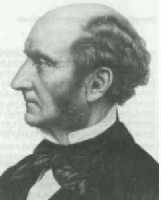“It was in the autumn of 1826. I was in a dull state of nerves…unsusceptible to enjoyment or pleasurable excitement….In this frame of mind it occurred to me to put the question directly to myself, ‘Suppose that all your objects in life were realised; that all the changes in institutions and opinions that you were looking forward to, could be completely effected at this very instant: would this be a great joy and happiness to you?’ And an irrepressible self-consciousness distinctly answered ‘No!’ At this my heart sank within me: the whole foundation on which my life was constructed fell down.”
This is how John Stuart Mill, writing in his autobiography, tells us about the great crisis in his life: what we might now call a nervous breakdown. Mill is one of philosophical history’s great infant prodigies. Urged by his pushy utilitarian father, he was also intended as a living demonstration of the power of a rationally ordered way of life in pursuit of utilitarian objectives. Famously, John Stuart Mill started to learn Ancient Greek at the age of three. By the time of his breakdown at twenty, he had already been through a high pressure education and become a utilitarian campaigner. We can guess, however, that in this pressurised environment a great many other feelings were repressed. As repressed feelings tend to do, they made themselves unexpectedly, distressingly and disruptively manifest.
What makes Mill such an inspiring figure is the way that he dealt with this inner conflict. He neither tried to repress the inconvenient feelings further, nor did he entirely give way to them. Instead he learnt from them and modified his view of the world. He seems, in fact, to have integrated the conflicting desires, meanings and beliefs that lay behind this inner turmoil, by working through them in his philosophy. What had started off as a narrow, puritanical utilitarianism was broadened and modified in an attempt to recognise the importance of emotional and aesthetic experience. Mill became especially known for his essay On Liberty, the key founding text of liberalism and a hugely creative advance in the political thought of the time. In addition, with the collaboration of his wife Harriet, his essay On the subjection of women also became a key early text in the attempt to persuade the repressive male-dominated nineteenth-century world that women should also share men’s liberty as equal partners.
As with any other thinker one might identify as making an important contribution to our understanding of the Middle Way, Mill found a balance in some ways more than others. For example, Mill’s interpretation of Utilitarianism moves beyond the narrowness of his early mentor Jeremy Bentham, it still has the limitations of Utilitarianism in general. Bentham wanted to reduce moral decision-making to a ‘hedonic calculus’, in which the pleasures and pains likely to result from different possible actions would be quantified and weighed up in a notionally mathematical fashion. In the scales of this calculus, Bentham argued that every pleasure weighed equally, and should be measured only by its intensity, duration and other quantitative features: in his famous phrase “Pushpin is as good as poetry” (pushpin being a fairly mindless game played in pubs at the time). After his breakdown and recovery, Mill began to argue that some pleasures were better than others. However, he did not really have a convincing account of why poetry was better than pushpin that went beyond the weight of social consensus. That poetry might have benefits in terms of the meanings it offers us is too intangible an idea to fit easily into a utilitarian framework.
It is in On Liberty that I find Mill at his best and closest to the Middle Way. The utilitarianism is nominally there, but fades into the background beside Mill’s passionate argument for the freedom of expression and action. If you allow people to express unorthodox views and behave in unconventional ways, Mill argues, society as a whole will benefit, because these people will be able to develop and test out new and better ways of thinking and acting. Adults should thus be allowed to act as they wish provided they did not harm others in the process. Mill challenged those who thought they knew the truth as to whether they thought themselves (and the socially accepted view) infallible: if not, he argued, the possibility of error needed to be tested out in a free discussion in which better justified views would become evident. Mill here gives a very practical expression to the Middle Way in the recognition of basic uncertainty, and draws out its implication of tolerance that allows people to reach their own autonomous, but justified, conclusions.
Mill goes on “Even if the received opinion be not only true, but the whole truth; unless it be suffered to be, and actually is, vigorously and earnestly contested, it will, by most of those who receive it, be held in the manner of a prejudice, with little comprehension or feeling of its rational grounds. And not only this, but…the meaning of the doctrine itself will be in danger of being lost, or enfeebled, and deprived of its vital effect on the character and conduct: the dogma becoming a mere formal profession, inefficacious for good, but cumbering the ground, and preventing the growth of any real and heartfelt conviction, from reason and personal experience.”
Mill here puts his finger on some of the key features of metaphysical dogma. By repressing alternative views, it not only prevents debate and experiment that might help us address conditions more effectively, it also represses emotions and creates conflicting psychological states that inhibit creativity and well-being. Personal experience may give rise to new ideas and beliefs, but these potential innovations must be crushed at source in order to ensure social conformity with the dominant beliefs. Unhappy individuals and rigid, fragile societies are the result. So much of nineteenth century literature is about this: the struggles of individuals to find sustenance and fulfil their vision in a stiflingly conventional society. But before the nineteenth century society was no less dogmatic and conformist. It was due to people like John Stuart Mill that awareness of the possibility of an alternative began to spread in a way it had not existed before.
Perhaps many people in the twenty-first century take this as old hat. We take tolerance of harmless individual differences for granted, at least in theory. Mill’s liberalism in its turn has now become the basis of a kind of social orthodoxy, which sometimes just goes through the motions of supporting creative individual freedom, but sometimes also genuinely does support that freedom to great positive effect. The Middle Way has now become much more a question for individuals, because dogmas can be carried around with us inside as well as laid on us from outside. But the fact remains, that without that basic degree of liberalism, our ability to find a Middle Way is severely curtailed by social pressure and control. That, perhaps, is why modernity is a much better context to practice the Middle Way than the traditional and hierarchical societies of the Buddhist East, even though these societies transmitted the Buddha’s idea of the Middle Way for many centuries.
Link to index of other posts in the Middle Way Thinkers series

